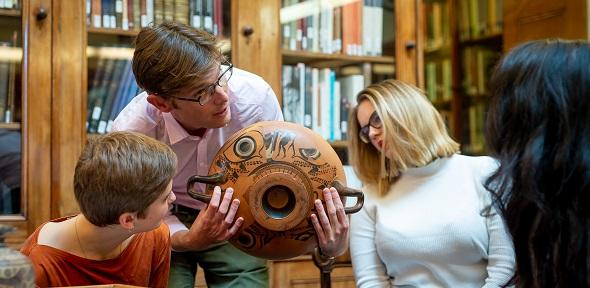
Submitted by Mr N M Thompson on Thu, 27/01/2022 - 16:12
We are delighted to announce that Michael Squire, Professor of Classical Art, King’s College London, has been elected Laurence Professor of Classical Archaeology as successor to Professor Martin Millett who retires on 30 September 2022. The Laurence Professorship of Classical Archaeology was established in 1930 at the bequest of Sir Perceval Maitland Laurence who studied Classics at Cambridge. Professor Squire will take up the Chair in January 2023.
Professor Squire is an authority on Graeco-Roman visual culture and has published widely on Greek and Roman art, the history of aesthetics, the relationship between visual and literary works and the classical tradition. His first degree was in Classics, his MPhil in Classical Archaeology (both at Trinity College, Cambridge). Following a year as Frank Knox Memorial Fellow at Harvard, he returned to Cambridge to complete his PhD and held a Junior Research Fellowship at Christ’s College, Cambridge. Professor Squire joined the Department of Classics at King’s College London in 2011 and has held recent fellowships and visiting appointments at Cologne, Munich, Stanford and at both the Wissenschaftskolleg and Max-Planck Institut für Wissenschaftsgeschichte in Berlin.
Commenting on Professor Squire’s appointment, Professor James Warren, Chair of the Faculty Board said: "We are very excited to welcome Professor Squire back to Cambridge where he will add his expertise to our existing strengths in Greek and Roman visual culture. As the Laurence Professor of Classical Archaeology, he will enhance our commitment to thinking about the interaction between different aspects of Greek and Roman culture and examining the long tradition of the reception of the ancient Greek and Roman worlds."
Professor Squire commented: “I’m hugely looking forward to returning to Cambridge and joining the Faculty of Classics. Classical Archaeology at Cambridge is something very special: it’s not just the number of specialists that makes it so remarkable, but also the diversity of their expertise, within a close-knit and collaborative research community. It’s a tradition that I look forward to developing, all the while helping to nurture the Classical Archaeologists of the future.”
